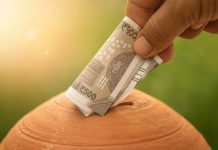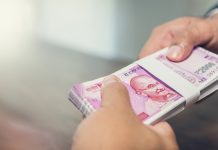 |
The US dollar edged higher versus the Pakistani Rupee across the week. The pair opened the week at 156.200 before rallying to a high of 156.755 on Tuesday. The dollar then slipped lower versus the Pakistani Rupee on Wednesday and Thursday before the dollar rebounded on Friday. The pair gained 0.5% across the week after shedding 0.5% across the previous week. The pair is finishing November at approximately the same price that it started the month.
Dollar’s Week Of Two Halves
The start of the week was a busy week for US macroeconomic data and US — China trade headlines, the two principal drivers of the dollar. In the second part of the week the US dollar was much more subdued owing to the Thanksgiving holiday on Thursday and half day on Friday.
Macro Data
Consumer Confidence
The dollar dipped lower on Monday after data showed that household sentiment unexpectedly declined in November. The Consumer confidence index dropped to 125.5, down from 125.9. This was well below analysts’ expectations of 127.
This was the fourth consecutive month that confidence weakened. The weaker data weighed on demand for the dollar, this is because less confident consumers tend to spend less. Lower spending in turn slows the economy and means lower inflationary pressures.
Looking at the data on a historical level, sentiment is still elevated. This should actually support solid spending during the crucial holiday season, which is important for the economy.
GDP
The dollar soared higher on Tuesday with the release of US GDP data and strong durable goods orders. The US economy expanded at a faster rate than initially forecast in the third quarter. The Q3 GDP estimate was revised higher to 2.1% on an annualised basis, well above the initial 1.9% estimate. The revised estimate in addition to a strong rebound is durable goods orders in October helped to ease concerns over the health of the US economy, particularly the manufacturing sector and business investment which have been negatively impacted by the ongoing US — China trade dispute. The better than forecast data supports the Federal Reserve’s belief that the US economy is holding up, despite the slowing global economy.
Trade
At the start of the week both the US and China appeared to agree that a phase one trade deal was in sight. Then, on Wednesday when the US stock markets shut, President Trump quietly signed the Hong Kong bill into law. The bill supports the human rights of the pro-democracy protesters. This was a move that could damage the already fragile US — China relations, potentially preventing or at least slowing progress towards a phase one trade deal. The timing of this move by Trump was important, because the US financial markets were closed the following day for Thanksgiving, meaning investors didn’t properly react to the news. There is a chance that investors will get to react on Monday, however, if China doesn’t retaliate then there’s a chance that the dollar won’t react on Monday when traders return to their desks.
Week Ahead
With dollar traders returning from Thanksgiving break volatility in the dollar is expected to pick up. In addition to any trade headlines, US dollar investors will have several high impacting macro data releases to digest. These include the ISM index, ADP private payroll report and the US non-farm payroll report, the most closely watched macro data release of the month.
Pakistani Rupee Well Supported on 13.25% Interest Rate
The Pakistani Rupee held been well supported across the week following the State Bank of Pakistan’s monetary policy decision last Friday, 22nd November. The SNP left the benchmark rate at 13.25%, an eight-year high and the highest rate in Asia, for the next two months. The policy decision was broadly expected as the central bank battles to control high inflation and stabilise the economy.
Following a 25.5% devaluation versus the dollar this year, inflation in October was at 11% year on year, in part owing to rising food prices amid temporarily supply disruptions. However, given that the central bank sees these inflationary factors as temporary phenomenon the SNP are not looking to hike rates again. They aim to reduce rates to 5%-7% by mid-2020; an ambitious target.
Pakistan is one of the few countries in the world where interest rates have gone up in the past six months. In comparison, the Federal Reserve has cut interest rates 3 times this year, sparking a race to the bottom between some central banks across the globe. The SNP has no plans to start cutting interest rates until inflation shows signs of weakening, which could still be some time away. Investors will look ahead to the inflation report on Monday. Analyst predict that inflation will tick higher to 11.2%.
Foreign Investment
Following the $6 million bailout secured by the Pakistani government from the international monetary fund, and as a result of the high interest rate and promise of economic reforms, Pakistan is experiencing an unprecedented wave of foreign investment from fund managers. It was noted this week that foreign investors were flocking to Pakistani bonds at the fastest rate in history.
According to the SNP, this month alone foreign investors have purchased $642.5 million of domestic bonds providing strong inflows and increasing demand for the currency.
Whilst this is encouraging on the surface, some analysts have highlighted that as soon as interest rates start to fall. These foreign investors will withdraw their investment in the future. This would act as a drag on the currency.
Politics
Politics play a central role in driving risk sentiment, which impacts a currency. This week politics were very much in focus as Pakistan’s top court granted a six-month extension to the term of the country’s army head General Qamar Javed Bajwa. The ruling comes after the court initially blocked a three-year extension to his tenure. The court delivered the verdict on Thursday, the Pakistani Rupee edged higher versus the Dollar.
The matter has now returned to Parliament’s hand, who will need to change the laws if Bajwa is to extend his term for three years. Regardless, the whole episode could weaken the authority of Imran Khan’s government which in turn could weigh on demand for the Pakistani Rupee.
 |




